
A pianist is an individual musician who plays the piano. Since most forms of Western music can make use of the piano, pianists have a wide repertoire and a wide variety of styles to choose from, among them traditional classical music, jazz, blues, and all sorts of popular music, including rock and roll. Most pianists can, to an extent, easily play other keyboard-related instruments such as the synthesizer, harpsichord, celesta, and the organ.

In music, a cadenza is, generically, an improvised or written-out ornamental passage played or sung by a soloist or soloists, usually in a "free" rhythmic style, and often allowing virtuosic display. During this time the accompaniment will rest, or sustain a note or chord. Thus an improvised cadenza is indicated in written notation by a fermata in all parts. A cadenza will usually occur over the final or penultimate note in a piece, the lead-in or over the final or penultimate note in an important subsection of a piece. It can also be found before a final coda or ritornello.
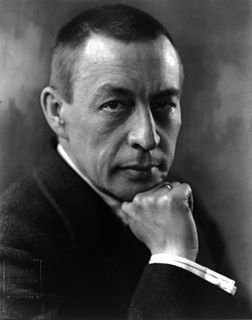
Sergei Vasilyevich Rachmaninoff was a Russian composer, virtuoso pianist, and conductor of the late Romantic period. The influence of Tchaikovsky, Rimsky-Korsakov, Balakirev, Mussorgsky, and other Russian composers is seen in his early works, later giving way to a personal style notable for song-like melodicism, expressiveness and rich orchestral colors.
Sergei Rachmaninoff's Piano Concerto No. 3 in D minor, Op. 30, was composed in the summer of 1909. The piece was premiered on November 28 of that year in New York City with the composer as soloist. The second performance of the concerto took place on January 16th, 1910 and featured Gustav Mahler conducting. The work often has the reputation of being one of the most technically challenging piano concertos in the standard classical piano repertoire.
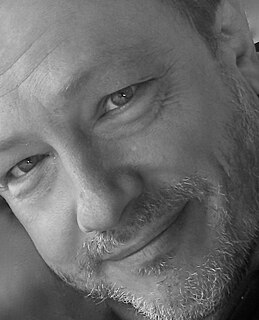
Marc-André Hamelin, OC, CQ, is a Canadian virtuoso pianist and composer. Hamelin is recognized worldwide for the originality and technical proficiency of his performances of the classic repertoire. He has received 11 Grammy Award nominations.
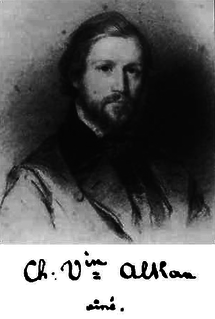
Charles-Valentin Alkan was a French-Jewish composer and virtuoso pianist. At the height of his fame in the 1830s and 1840s he was, alongside his friends and colleagues Frédéric Chopin and Franz Liszt, among the leading pianists in Paris, a city in which he spent virtually his entire life.
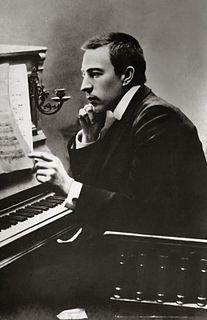
The Piano Concerto No. 2 in C minor, Op. 18, is a concerto for piano and orchestra composed by Sergei Rachmaninoff between the autumn of 1900 and April 1901. The second and third movements were first performed with the composer as soloist on 2 December 1900. The complete work was premiered, again with the composer as soloist, on 9 November 1901, with his cousin Alexander Siloti conducting.
John Andrew Howard Ogdon was an English pianist and composer.

Piano Concerto No. 4 in G minor, Op. 40, is a major work by Russian composer Sergei Rachmaninoff, completed in 1926. The work exists in three versions. Following its unsuccessful premiere, the composer made cuts and other amendments before publishing it in 1928. With continued lack of success, he withdrew the work, eventually revising and republishing it in 1941. The original manuscript version was released in 2000 by the Rachmaninoff Estate to be published and recorded. The work is dedicated to Nikolai Medtner, who in turn dedicated his Second Piano Concerto to Rachmaninoff the following year.

Leslie John Howard is an Australian pianist, musicologist and composer. He is best known for being the only pianist to have recorded the complete solo piano works of Franz Liszt, a project which included more than 300 premiere recordings. He has been described by The Guardian as "a master of a tradition of pianism in serious danger of dying out".
Howard Gordon Shelley is a British pianist and conductor. He was educated at Highgate School and the Royal College of Music. He is married to fellow pianist Hilary Macnamara, with whom he has performed and recorded in a two-piano partnership, and they have two sons.
Peter Dickinson is an English composer, musicologist, author, and pianist, best known for his experimental musical compositions and writings on American music.
Olli Mustonen is a Finnish pianist, conductor and composer.
Concerto for Solo Piano is a 3-movement solo piano piece written by Charles-Valentin Alkan. The pieces are part of a 12 piece cycle entitled Douze études dans tous les tons mineurs, published in 1857. With sections marked "Tutti", "Solo" and "Piano", the piece requires the soloist to present the voices of both the orchestra and the soloist. The pianist Jack Gibbons comments: "The style and form of the music take on a monumental quality—rich, thickly set textures and harmonies ... conjure up the sound world of a whole orchestra and tax the performer, both physically and mentally, to the limit."
While a concerto is generally a piece for an instrument or instruments with orchestral accompaniment, some works for piano alone have been written with the seemingly contradictory designation concerto for solo piano.
Joseph Alfidi was an American pianist, composer, and conductor and initially a child prodigy. He was born in Yonkers, New York as the son of American-born parents of Italian descent, his father, Frank Alfidi, was an accordion player who ran a music school in Yonkers. Known as "Joey" in his childhood, he was three when he started to play several instruments in his father's studio. By the age of four, he frequently improvised little compositions at the piano, and soon became fascinated by symphonic music as well.
Martino Tirimo is a Cypriot classical pianist.
Santiago Rodriguez is a Cuban-American pianist. Rodriguez is an exclusive recording artist for Élan Recordings. His Rachmaninov recordings received the Rosette award in The Penguin Guide to Recorded Classical Music and he is a Silver Medalist in the Van Cliburn International Piano Competition.
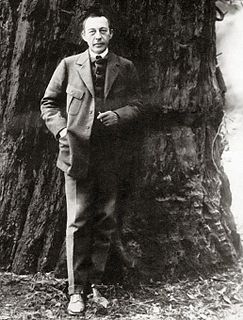
Sergei Vasilievich RachmaninoffRussian pronunciation: [sʲɪrˈɡʲej rɐxˈmanʲɪnəf]; 1 April [O.S. 20 March] 1873 – 28 March 1943) was a Russian composer, virtuoso pianist, and conductor. Rachmaninoff is widely considered as one of the finest pianists of his day and, as a composer, one of the last great representatives of Romanticism in Russian classical music.